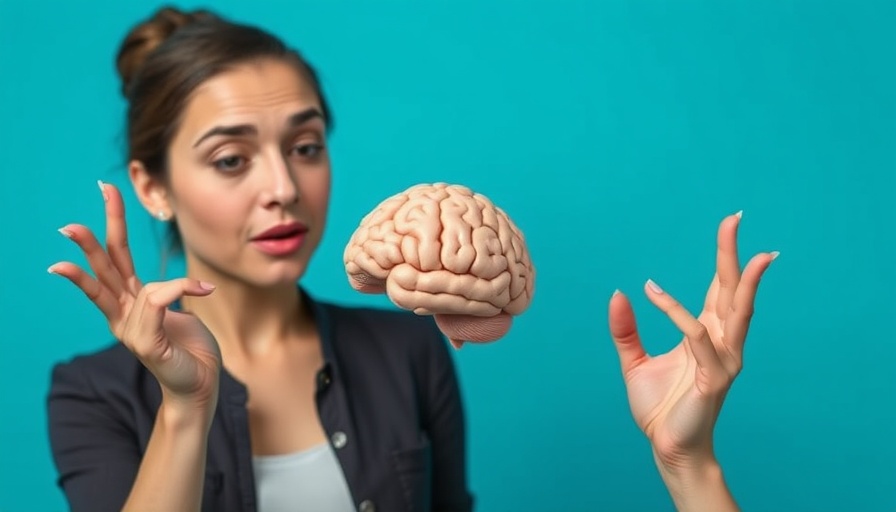
Understanding ADHD and Anxiety: Unraveling the Connection
The complexities of mental health often intersect in surprising ways, particularly when it comes to anxiety and ADHD. It's easy to confuse the symptoms of these two conditions, as their manifestations can be strikingly similar. But how do anxiety and ADHD relate, and what can we learn from their interconnectedness? In this article, we will explore the overlapping symptoms, delve into the neurological roots of these conditions, and suggest actionable strategies for therapeutic approaches.
In 'A nerdy deep dive into ADHD and Anxiety', the discussion dives into the complex relationship between ADHD and anxiety, exploring key insights that sparked deeper analysis on our end.
Symptom Overlap: The Trees of Anxiety and ADHD
Imagine anxiety as a sturdy lemon tree and ADHD as a vibrant lime tree standing side by side. Although their leaves may appear identical, their roots are distinctly different. Up to 50% of individuals with ADHD also experience anxiety disorders, resulting in muddled symptoms that can be hard to pinpoint. Both conditions manifest through racing thoughts, sleep disturbances, and difficulties in focusing.
For instance, a person with anxiety might find themselves in a cycle of worry—expected outcomes loom heavily on their minds, amplifying emotional distress. Conversely, someone with ADHD may face challenges with executive function, leading to pervasive overwhelm, indecision, and impulsivity. This whirlwind of overlapping symptoms can lead to misunderstandings and misdiagnoses, complicating effective treatment approaches.
Executive Function: The Brain's Control Center
The key distinction lies in executive function, the cognitive process enabling individuals to manage thoughts and actions to meet goals. ADHD is characterized by deficits in executive function, which complicates emotional processing. Consider a college student overwhelmed by looming deadlines. They may struggle to prioritize tasks, causing anxiety about grades and leading to procrastination—just one example of how the dysfunction of executive function fuels anxiety.
The Science of Stress and Neurobiology
At the core of anxiety is the brain's response to perceived threats, managed by the amygdala. When anxiety dominates, it often disrupts the prefrontal cortex, which is responsible for reasoning and planning. This means that an anxious individual may be unable to focus on mundane tasks, like homework or day-to-day chores.
Understanding this neurobiological connection is vital—it informs interventions. For instance, by addressing executive function deficiencies in ADHD, one may simultaneously alleviate anxiety symptoms. Simple strategies like prioritization, organization skills, and behavioral therapy can work wonders.
Practical Strategies for Managing ADHD and Anxiety
Now that we grasp the connection between anxiety and ADHD, let’s explore some actionable strategies:
- Exercise Regularly: Physical activity is proven to enhance executive function while reducing anxiety.
- Structured Journaling: Writing can clear mental clutter, turning racing thoughts into organized reflections, facilitating emotional processing.
- Utilize Visual Reminders: Keeping visual cues in your environment helps in maintaining focus and surfacing memories related to support and coping mechanisms.
- Set Clear Goals: Establish achievable tasks, focusing on the process rather than the product.
- Seek Professional Support: Therapists or counselors specializing in ADHD and anxiety can provide tailored strategies that address specific challenges.
Conclusion: Building a Healthier Future
The intertwined nature of ADHD and anxiety presents both challenges and opportunities. By understanding the distinctions and similarities, we can develop holistic strategies to manage both conditions. As we foster a deeper comprehension of how these neurological functions intersect, we unlock new pathways to improved mental wellness. Whether it's through supportive therapy, lifestyle changes, or promoting emotional awareness, knowledge is a powerful tool in our journey towards enhancing mental health.
Remember, you are not alone in this journey. By taking actionable steps grounded in understanding the connection between ADHD and anxiety, you pave the way for a healthier, happier life. Explore your options for support today, so together we can foster a community that thrives on understanding and compassion.
 Add Row
Add Row  Add
Add 




Write A Comment